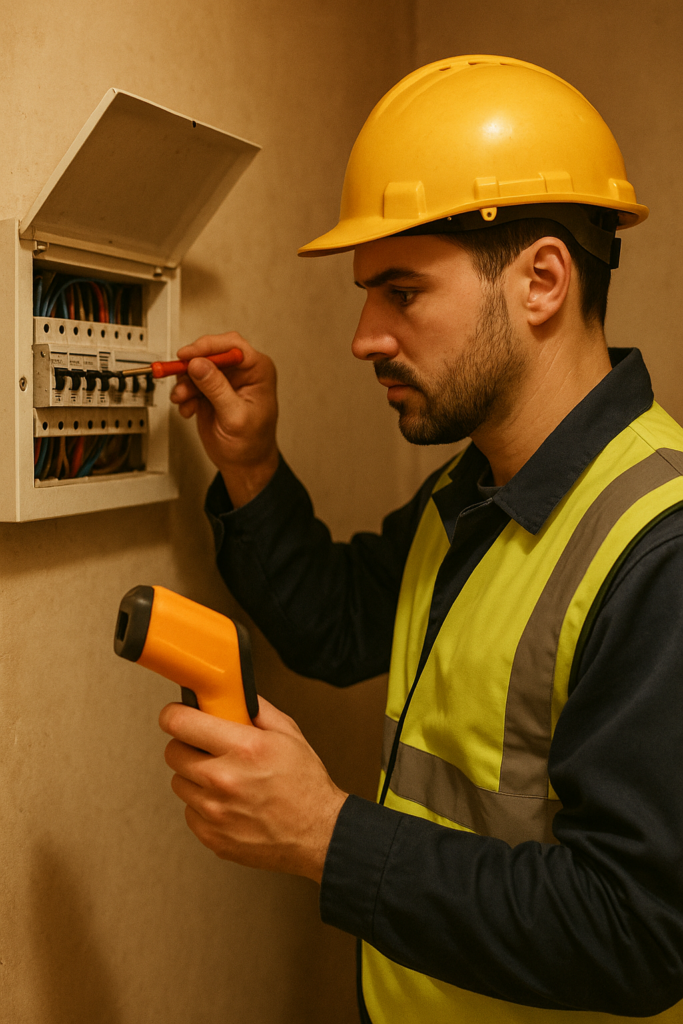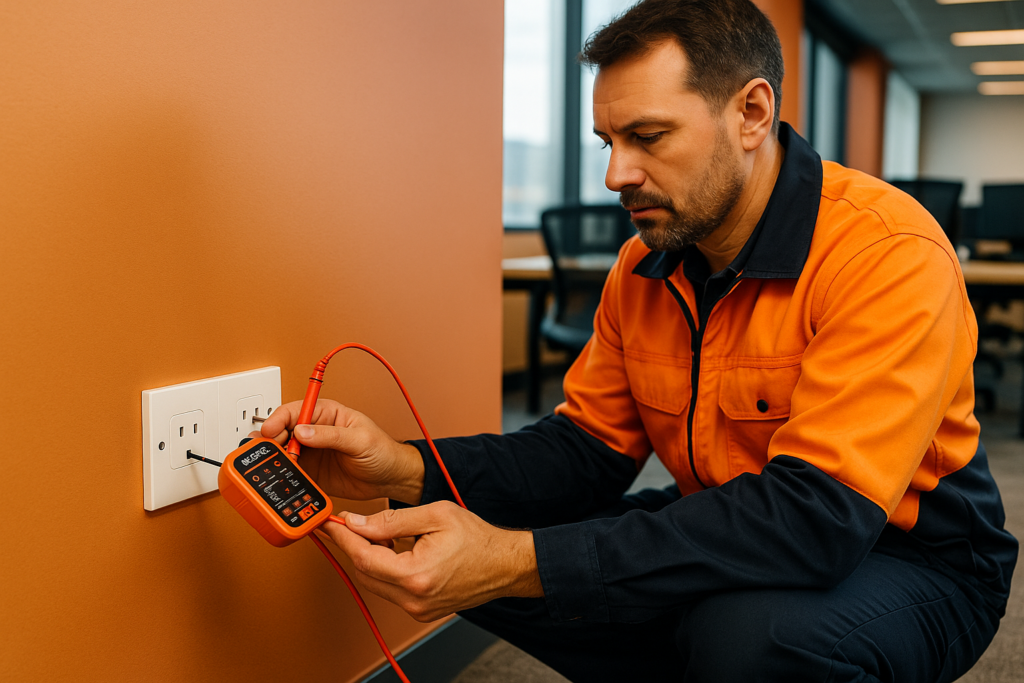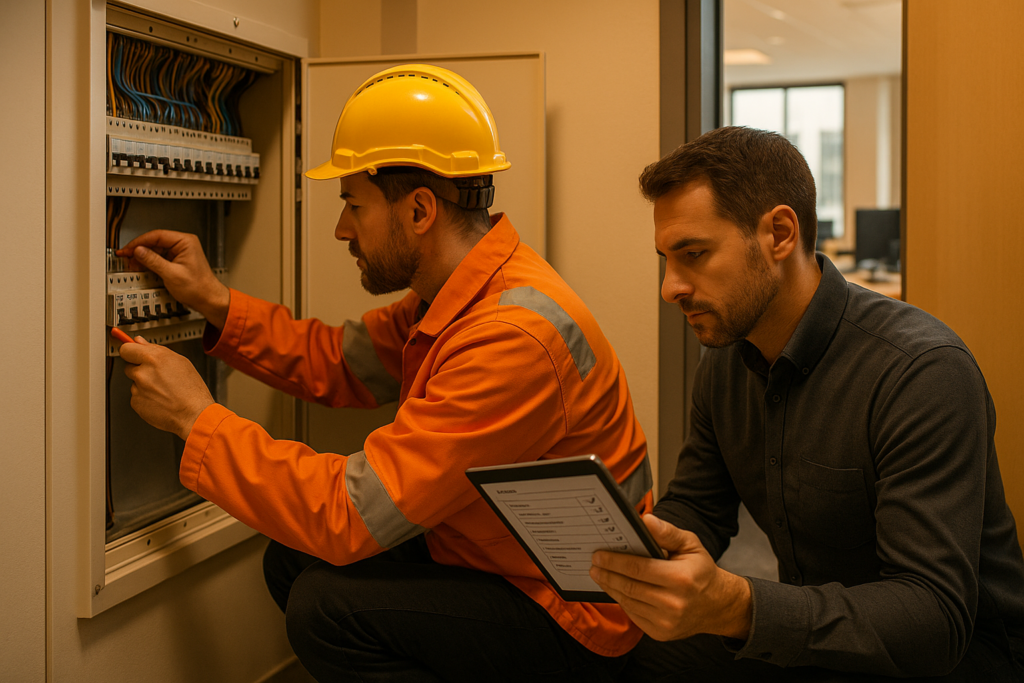Electrical Safety Reports for Landlords & Businesses
Why Choose All Well for Your EICR?
- All reports carried out by NICEIC-certified electricians
- Fast appointment availability across London & Greater London
- Clear, jargon-free reports with recommendations
- Support with remedial works, if needed
- Digital certification for easy record keeping
Ensure your property is safe and legally compliant with a professional EICR (Electrical Installation Condition Report) from qualified, NICEIC-certified electricians.
We understand compliance and safety — and we make it simple, fast, and stress-free.
What’s Included in Our EICR (Electrical Safety Report) Service
Fixed Wiring Inspection & Testing
As part of every EICR report, our NICEIC-certified electricians perform a thorough inspection of your property’s fixed wiring system. This includes testing all circuits that distribute electricity from the consumer unit (fuse board) to sockets, switches, lights, and other fixed electrical points. We check for signs of wear, degradation, damage, or overheating that may not be visible to the naked eye but could pose serious safety risks.
We use calibrated electrical testing equipment to assess circuit integrity and insulation resistance. This ensures that the wiring can safely handle electrical loads and hasn’t deteriorated due to age, pests, moisture, or DIY alterations. A poorly maintained electrical system is one of the most common causes of fires in UK homes and commercial buildings, which is why periodic inspection and testing is so essential.
Fixed wiring testing is particularly important for landlords and businesses who are legally obligated under the Electrical Safety Standards in the Private Rented Sector (England) Regulations 2020 and the Health and Safety at Work Act 1974. By identifying hidden faults early, you can prevent outages, legal penalties, or worse — life-threatening incidents.

Fuse Board Checks

Your consumer unit, often referred to as the fuse board, is the central hub of your electrical system. During our EICR inspections, we assess its layout, labelling, functionality, and the integrity of the circuit protection devices it houses. This includes testing the performance of MCBs (Miniature Circuit Breakers) and RCDs (Residual Current Devices), which are critical for detecting and cutting off dangerous currents.
We verify whether your current setup complies with the latest edition of the BS 7671 Wiring Regulations. Outdated or damaged fuse boards not only increase the risk of electrical faults and fires but may also invalidate insurance policies or cause you to fail compliance inspections. Modern units with correctly installed RCDs can drastically reduce the chance of electrical shock or fatal electrocution.
Landlords are now required to ensure their consumer unit is safe and that electrical systems are inspected every five years. If your board lacks proper labelling, contains obsolete fuses, or shows signs of burning or tampering, it’s likely non-compliant. Our team will document any concerns and provide clear guidance on necessary upgrades.
Sockets, Switches & Lighting Circuit Testing
Sockets, light switches, and fixed lighting circuits are among the most used and often overlooked components of an electrical system. During an EICR, we test these fittings for proper wiring, signs of overheating, loose connections, damaged faceplates, and polarity issues. Each point is examined for compliance and safety, particularly in high-use or high-risk areas such as kitchens, bathrooms, and communal spaces.
We conduct continuity tests and polarity verification to ensure that live and neutral wires are correctly placed and safely connected. Miswired or damaged fittings can cause electric shock, equipment damage, or pose fire hazards. We also check if sockets are overloaded or located too close to water sources without proper protection, which could result in immediate non-compliance.
These tests are particularly vital in rented properties, HMOs, and commercial buildings where wear and tear is more common. Tenants and employees rely on these fittings daily, and unsafe equipment could lead to injury claims or regulatory breaches. By identifying unsafe points early, we help you reduce liability and maintain a safe, fully functional space.


Earthing & Bonding Inspection
Earthing and bonding are fundamental safety systems that protect building occupants from electric shock and prevent electrical faults from escalating into serious hazards. In every EICR inspection, we test whether your electrical installation is adequately earthed and that main services (such as water and gas pipes) are correctly bonded in line with UK electrical regulations.
We use resistance and continuity testing to verify the presence and integrity of earthing conductors. Without a proper earthing system, faulty appliances or damaged wiring could energise metal parts and create electrocution risks. Bonding ensures that metal pipework and conductive systems remain at the same electrical potential, reducing the chance of a voltage difference that could cause harm.
For commercial properties and landlords, failure to maintain earthing and bonding systems can result in insurance issues, regulatory breaches, and prosecution if an incident occurs. Many older properties, particularly in London, still lack proper bonding or have had cables tampered with or removed. Our EICR inspections detect these issues and provide clear remediation steps to meet full compliance.
Digital EICR Certificate with Observations & Classifications
After every electrical safety inspection, we issue a formal EICR certificate in digital PDF format. This document details the results of our tests, lists any faults or non-compliances found, and classifies each observation according to standard electrical risk categories:
C1 – Danger present (requires immediate action)
C2 – Potentially dangerous (urgent action recommended)
C3 – Improvement recommended (not essential for compliance)
FI – Further investigation required
We make the reporting clear and easy to understand — no technical jargon or confusing abbreviations. You’ll know exactly where you stand, what actions (if any) are needed, and what steps to take to bring the property up to standard. This is especially important for landlords and letting agents who must share valid reports with tenants and local authorities.
This certificate becomes your legal record of compliance, and in many cases, it may be requested by mortgage lenders, insurers, or building control. Our documentation helps you stay covered, avoid fines, and demonstrate a proactive approach to safety.


Remedial Work Guidance & Support
If your EICR report reveals issues requiring remedial action, we provide a detailed breakdown of the problems, estimated costs, and a clear path to resolution. We never leave clients guessing — we explain the severity of each issue, outline whether it’s legally required or recommended, and offer a fair, fixed quote to complete the work.
All remedial work is carried out by the same NICEIC-certified electricians, ensuring consistency, traceability, and full regulatory compliance. Whether it’s replacing a fuse board, upgrading damaged sockets, or improving bonding, we carry out the work swiftly and document everything for your records.
Landlords must complete remedial work within 28 days (or sooner if the report specifies) — and we help you meet that obligation with minimal disruption. Once the work is complete, we issue confirmation and updated documentation to show your property is safe, compliant, and ready for use.
Who Needs an EICR Certificate?
If you’re a:
Private landlord – Legally required every 5 years under the Electrical Safety Standards in the PRS (2020)
Letting agent – Must ensure reports are up to date before new tenancies
Business owner or commercial landlord – Responsible for duty of care under Health and Safety at Work Act
Housing provider or HMO manager – Subject to additional licensing and compliance regulations
…then you need a valid EICR to protect occupants and avoid legal penalties.
Looking for an ‘Electrical Safety Report (EICR)’?
Get in touch today.
We operate across all 33 boroughs, including:
City of London, Westminster, Camden, Islington, Southwark, Lambeth, Kensington & Chelsea, Hackney, Tower Hamlets, Greenwich and beyond – including Kent, Essex and Surrey.
EICR London – FAQs
Landlords must have an EICR carried out at least every 5 years or at the start of each new tenancy under the Electrical Safety Standards in the Private Rented Sector (England) Regulations 2020. Commercial properties should also be tested regularly based on risk and usage. If your last report has expired, your property may be non-compliant and at risk of fines or enforcement action.
An EICR includes the inspection and testing of your property’s fixed electrical system, such as wiring, sockets, light fittings, consumer unit (fuse board), and protective devices. The report identifies any faults, deterioration, or non-compliance with BS 7671 regulations, categorised by severity (C1, C2, C3, FI). You’ll also receive a digital certificate with all findings clearly explained.
No. Since July 1, 2020, it is a legal requirement for landlords in England to provide a valid EICR before renting out a property. Failing to obtain one can result in civil penalties of up to £30,000, void insurance claims, or even prosecution if an electrical fault causes harm. If you don’t have an up-to-date EICR, book an inspection immediately to meet your legal obligations.
If your EICR identifies C1 (dangerous) or C2 (potentially dangerous) issues, you must carry out remedial work within 28 days (or sooner, if specified). Once the issues are resolved, you’ll need written confirmation that the installation is now safe. At All Well, we provide a full breakdown of the issues, clear pricing for any necessary remedial work, and post-repair documentation to help you stay fully compliant.